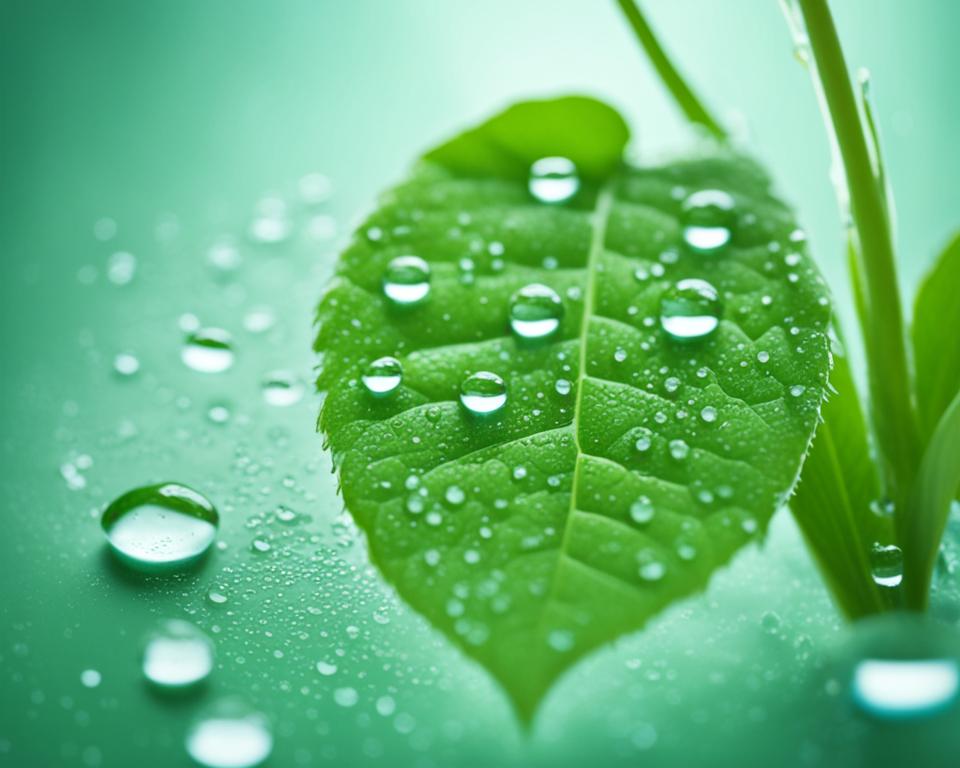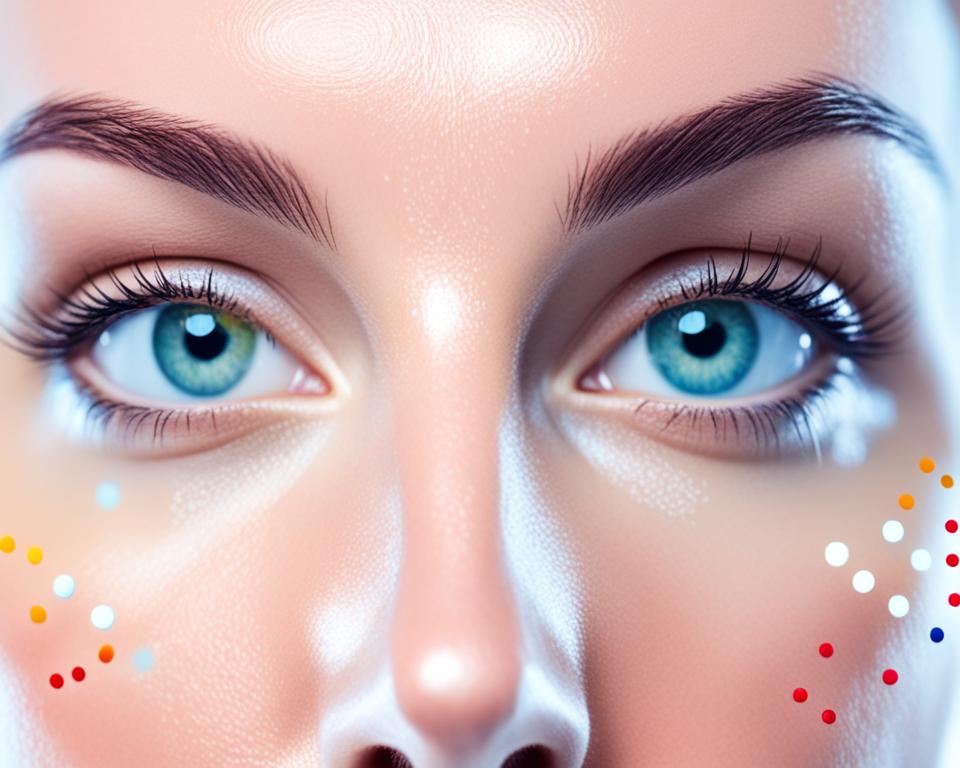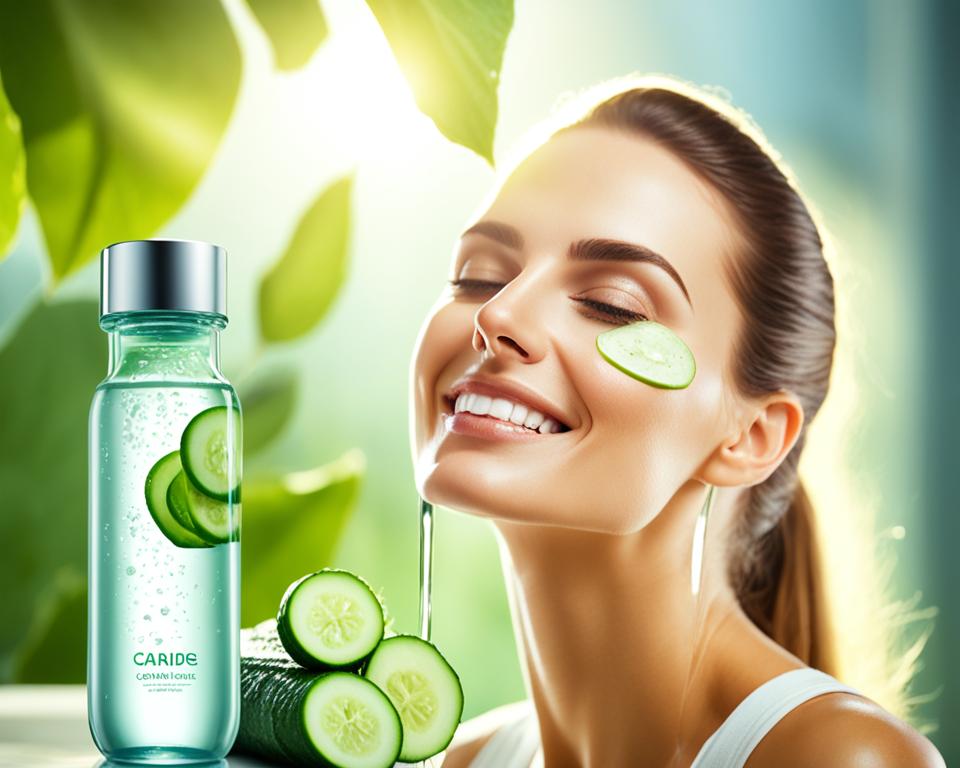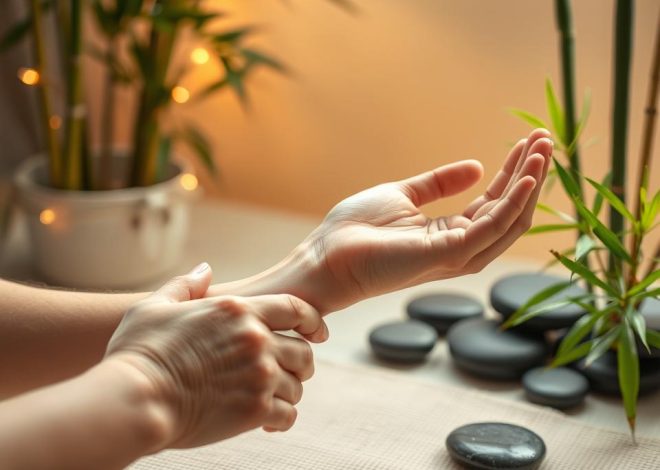
Hydration Facts: Is Water Good for Your Skin?
Welcome to our in-depth exploration of the relationship between hydration and skin health. In this article, we will delve into the importance of hydration for your skin and address the question: Is water good for your skin?
We will examine the benefits of water for skin and discuss how hydration directly impacts your skin’s condition. It’s no secret that water is crucial for our overall health and well-being, but how does it specifically affect our largest organ, the skin?
Many individuals wonder how drinking water can lead to glowing skin and improved complexion. We will explore the impact of water on skin condition and shed light on the mechanisms through which hydration affects skin moisture, elasticity, and overall health. Additionally, we will discuss whether water intake alone is enough to prevent or treat common skin issues.
So, if you’re curious about the role of hydration in maintaining youthful-looking skin and how it can potentially minimize the signs of aging, wrinkles, and fine lines, you’ve come to the right place.
In the following sections, we will explore the importance of a holistic approach to skincare, understanding the needs of different skin types, and tips for healthy hydration that can contribute to glowing skin. Let’s dive in!
Read more interesting information at ::i-pasta
The Relationship Between Water and Skin Health
When it comes to maintaining healthy skin, the relationship between water and skin health is undeniable. Hydration plays a crucial role in keeping our skin supple, radiant, and resilient. Dehydration, on the other hand, can lead to dryness, dullness, and various skin issues.
Water is the foundation of good skin health. It helps to maintain the skin’s natural moisture balance, which is essential for a healthy skin barrier. When our skin is adequately hydrated, it functions optimally, protecting us from environmental stressors and maintaining its youthful appearance.
One of the key benefits of water for skin health is its ability to promote proper moisture levels. When we drink enough water, it hydrates our body from the inside, replenishing moisture that can be lost due to factors like sun exposure, air conditioning, or harsh skincare products. This internal hydration is reflected in our skin’s appearance, contributing to a more supple and glowing complexion.
Additionally, water helps to flush out toxins from our body, including those that may affect our skin health. By staying hydrated, we support the detoxification process, allowing our skin to maintain its clarity and brightness.
There are several factors that contribute to the overall impact of water on our skin health. These include:
- Daily water intake: The amount of water we drink each day directly affects our skin’s hydration levels. While the recommended daily intake varies for individuals, ensuring adequate hydration is crucial for promoting healthy skin.
- External factors: Environmental conditions, such as dry air or low humidity, can deplete our skin’s moisture. By drinking enough water, we can help counteract these external factors and maintain optimal hydration.
- Skincare products: While water alone is beneficial for the skin, using hydrating skincare products can provide an added layer of moisture and support. The combination of internal hydration and external hydration can amplify the positive effects on our skin health.
Overall, the relationship between water and skin health is multifaceted. By prioritizing hydration and ensuring an adequate water intake, we can support our skin’s natural functions and promote a healthy, radiant complexion.
How Does Hydration Affect Your Skin?
Hydration plays a crucial role in maintaining the health and vitality of your skin. Water, the foundation of life, has a profound impact on our body’s largest organ. Let’s explore how hydration affects your skin and why it is essential for its overall well-being.
Your skin relies on proper moisture balance to function optimally. When adequately hydrated, it maintains its natural elasticity and suppleness, giving you a youthful and radiant appearance. On the other hand, inadequate hydration can lead to dryness, flakiness, and even premature aging.
The Role of Water in Maintaining Skin Moisture
Water acts as a natural moisturizer for your skin, helping to keep it hydrated from within. When you drink enough water, it circulates throughout your body, reaching your skin cells and providing them with the hydration they need. This prevents dryness and helps to maintain a healthy skin barrier.
“Proper hydration from water consumption can help improve skin moisture levels and reduce the risk of dryness and irritation.” – Dr. Emily Richards, Dermatologist
Additionally, water helps your skin retain moisture. It prevents water loss through the skin’s surface by creating a barrier that seals in hydration. As a result, your skin stays plump, smooth, and resilient.
Enhancing Skin Elasticity and Overall Health
Hydration is vital for maintaining skin elasticity, which gives your skin its firmness and flexibility. When your skin is well-hydrated, it is more supple and resilient, making it less prone to wrinkles and sagging. Adequate water intake can help support the production of collagen, a protein that gives your skin structure and strength.
Besides improving elasticity, hydrated skin also has a healthier appearance. Water helps to flush out toxins and waste products from your skin, leaving it clear and radiant. It can also aid in reducing inflammation, redness, and irritation, promoting an even skin tone.
The Importance of Hydration for Skin Health
The importance of hydration for skin health cannot be underestimated. In addition to drinking enough water, using topical moisturizers and hydrating products can complement your internal hydration efforts. These products help to lock in moisture and further support your skin’s hydration levels.
To achieve and maintain healthy, hydrated skin, it is recommended to drink an adequate amount of water throughout the day. While individual hydration needs may vary, a general guideline is to aim for at least 8 glasses (64 ounces) of water daily.
Remember, hydration is just one piece of the skincare puzzle. A holistic approach that includes a balanced diet, a consistent skincare routine, and protection from environmental factors can maximize the benefits of hydration for your skin.
Now that we understand how hydration affects your skin, let’s explore the specific benefits of water for your skin in the next section.
The Benefits of Water for Skin
When it comes to achieving a healthy and radiant complexion, adequate hydration plays a crucial role. The benefits of water for your skin are numerous, and staying hydrated can contribute to a glowing complexion and improved skin texture.
“Water is the foundation of healthy skin. It helps to maintain the skin’s moisture balance, keeping it plump, supple, and vibrant.”
Enhanced Moisture
Water intake for glowing skin is essential as it helps to moisturize your skin from the inside out. When you’re properly hydrated, your skin retains moisture more efficiently, preventing dryness and flakiness. This enhanced moisture content can result in a soft, smooth, and healthy complexion.
Improved Skin Elasticity
Dehydration can lead to a loss of skin elasticity, making it appear dull and saggy. By drinking enough water, you can help maintain the elasticity of your skin, promoting a more youthful and firm appearance. Hydrated skin has the ability to bounce back and maintain its natural elasticity, reducing the appearance of fine lines and wrinkles.
Flushes Out Toxins
In addition to moisturizing your skin, water also plays a vital role in eliminating toxins from your body. Proper hydration helps to flush out waste and impurities, which can contribute to clearer and healthier skin. By staying well-hydrated, you support your body’s natural detoxification processes and reduce the likelihood of clogged pores and breakouts.
Enhanced Nutrient Absorption
Water intake not only promotes the elimination of toxins but also aids in the absorption of essential nutrients that contribute to skin health. When your body is well-hydrated, nutrients from your diet are more effectively transported to your skin cells, supporting their overall health and vitality. This can result in a more vibrant and youthful complexion.
Overall Skin Health
By prioritizing water intake for glowing skin, you are taking a proactive approach to maintaining overall skin health. Proper hydration helps to optimize skin function, including the regulation of oil production, maintenance of pH balance, and protection against external stressors. This balanced and healthy environment contributes to a clearer and more resilient complexion.
| Benefit | Description |
|---|---|
| Enhanced Moisture | Drinking water moisturizes the skin from the inside, preventing dryness and promoting a soft and smooth complexion. |
| Improved Skin Elasticity | Proper hydration helps maintain skin elasticity, reducing the appearance of wrinkles and promoting a firm and youthful look. |
| Flushes Out Toxins | Water helps eliminate toxins and waste from the body, resulting in clearer and healthier skin with reduced breakouts. |
| Enhanced Nutrient Absorption | Proper hydration supports the absorption of essential nutrients, improving overall skin vitality and vibrancy. |
| Overall Skin Health | Staying hydrated helps maintain optimal skin function, promoting a balanced complexion and protection against external stressors. |
The Impact of Water on Skin Condition
Water intake plays a crucial role in maintaining the health and condition of our skin. While hydration is often touted as a remedy for skin issues, it is important to understand the extent of its impact and whether it alone can prevent or treat common skin conditions.
When it comes to skincare, water acts as an essential component in maintaining skin hydration. Adequate hydration helps to keep our skin moisturized, supple, and plump, improving its overall condition. Dryness, irritation, and flakiness can be reduced by ensuring proper hydration.
However, it’s worth noting that water alone may not be a cure-all for skin issues. While hydration is an important factor, other factors such as genetics, lifestyle, diet, and skincare routine also play a significant role in determining the condition of our skin.
For example, certain skin conditions like acne, rosacea, and eczema are influenced by various internal and external factors, including hormonal imbalances, inflammation, and environmental triggers. While staying hydrated can support overall skin health, it may not be the sole solution to address these specific conditions.
Additionally, individuals with naturally oily skin may assume that drinking more water will help reduce oiliness. However, oil production is regulated by hormonal activity and genetics, and increased water intake may not directly impact this aspect of skin condition.
To truly improve skin condition and address specific skin concerns, it’s important to adopt a holistic approach that combines hydration, a balanced diet, a consistent skincare routine, and targeted treatments if necessary. Consulting with a dermatologist or skincare professional can provide personalized guidance and recommendations tailored to individual needs.
Remember, maintaining overall well-being and healthy skin relies on a combination of factors, with water intake being just one piece of the puzzle.
Water and the Skin: A Holistic Approach
To emphasize the importance of a holistic approach to skincare and skin condition management, let’s consider a simple quote from renowned dermatologist Dr. Leslie Baumann:
“Hydration is important for skin health, but it is not the only answer. Good skin care involves a comprehensive regimen of proper cleansing, exfoliation, moisturizing, sun protection, and targeted treatments when needed.”
Hydration-Boosting Foods
In addition to drinking water, incorporating hydrating foods into your diet can provide an extra boost to your skin’s moisture levels. Include foods rich in water content, such as:
- Cucumbers
- Watermelon
- Strawberries
- Citrus fruits
- Lettuce
- Celery
- Tomatoes
These fruits and vegetables not only hydrate from within but also contain essential vitamins and antioxidants that contribute to overall skin health.
The Hydration Monitor: Your Skin
Our skin provides valuable cues to help assess its hydration levels. Pay attention to the following signs:
- Texture: Hydrated skin tends to feel smooth and supple, while dehydrated skin may appear rough or flaky.
- Complexion: Well-hydrated skin often boasts a natural radiance, while lack of hydration can result in dullness or excessive oiliness to compensate for dehydration.
- Elasticity: Hydrated skin has more elasticity and resilience, while dehydrated skin may feel tighter and less plump.
By observing these indicators, you can gauge the effectiveness of your hydration routine and adjust as necessary.
Taking Control of Your Skin Health
While water intake is an essential part of maintaining healthy skin, understanding the broader context and incorporating a well-rounded approach to skincare is key. By considering other factors, seeking professional advice, and adopting a wholesome routine, you can optimize your skin condition and achieve a radiant, youthful complexion.
Hydration and Aging Skin
As we age, our skin undergoes various changes that can contribute to the appearance of wrinkles, fine lines, and a loss of elasticity. One important factor in maintaining youthful-looking skin is hydration. Adequate water intake plays a vital role in promoting skin health and minimizing the signs of aging.
When our skin is properly hydrated, it appears plump, smooth, and radiant. Hydration helps to maintain the skin’s natural moisture barrier, which is crucial for preventing dryness and promoting elasticity. Furthermore, water helps to flush out toxins and impurities from the body, which can improve overall skin clarity and reduce the risk of breakouts.
Dehydration, on the other hand, can accentuate the signs of aging. When the skin lacks moisture, it becomes dull, rough, and more susceptible to wrinkles. Fine lines can appear more pronounced, and the skin may lose its firmness and elasticity. Inadequate hydration can also impair the skin’s ability to heal and repair itself, leading to a slower recovery from environmental damage.
By prioritizing hydration, you can help combat the effects of aging on the skin. Drinking an adequate amount of water daily is essential for maintaining skin health and promoting a youthful complexion. In addition to staying hydrated from the inside, it’s important to support your skin’s hydration levels externally.
External Hydration: Moisturizers and Skincare
Using moisturizers and implementing an effective skincare routine can supplement the benefits of internal hydration. Moisturizers act as a barrier, sealing in moisture and preventing water loss from the skin. Look for moisturizers that are specifically formulated to hydrate and nourish aging skin, such as those containing hyaluronic acid or ceramides.
Incorporating hydrating serums and facial oils into your skincare regimen can further enhance the effects of hydration on aging skin. These products often contain ingredients that help to replenish moisture and support the skin’s natural collagen production, promoting a more youthful complexion.
Remember, consistency is key when it comes to skincare. Establishing a daily routine that includes cleansing, moisturizing, and protecting your skin from the sun’s harmful rays can contribute to long-term skin health and anti-aging benefits.
Other Factors That Affect Skin Hydration
In addition to water intake, several other factors can significantly impact skin hydration. Understanding these factors and their interaction with water can help you maintain healthier, more hydrated skin.
Environmental Conditions
The environment plays a crucial role in determining skin hydration levels. Factors such as temperature, humidity, and exposure to ultraviolet (UV) radiation can affect the skin’s natural moisture barrier. For instance, cold and dry weather conditions can lead to increased transepidermal water loss, causing dry and dehydrated skin. On the other hand, excessive sun exposure without adequate protection can damage the skin and disrupt its moisture balance.
Skincare Routine
Your skincare routine and the products you use can significantly impact skin hydration. The type of cleanser, moisturizer, and other skincare products you choose can either enhance or hinder your skin’s ability to retain moisture. Opting for hydrating cleansers, moisturizers with humectant ingredients like hyaluronic acid, and regular exfoliation can help keep your skin hydrated and healthy.
Dietary Choices
Your diet can also affect skin hydration from within. Consuming foods rich in water content, such as fruits and vegetables, can contribute to overall hydration levels. Additionally, important nutrients like omega-3 fatty acids and vitamins A, C, and E support skin health and hydration. Conversely, excessive consumption of alcohol and caffeine can lead to dehydration and negatively impact your skin’s moisture levels.
External Factors
External factors such as smoking, stress, and lack of sleep can have a profound effect on skin hydration. Smoking reduces blood flow, resulting in impaired skin health and decreased moisture levels. Chronic stress can disrupt the skin’s natural barrier function, leading to increased water loss. Additionally, inadequate sleep can contribute to dull and dehydrated skin.
“To maintain optimal skin hydration, it’s crucial to consider environmental conditions, follow a suitable skincare routine, make healthy dietary choices, and address external factors like smoking and stress.”
A Comprehensive Approach
Remember, while water intake is important for skin hydration, it’s necessary to take a comprehensive approach that considers various factors. By incorporating these factors into your skincare regimen and lifestyle, you can optimize your skin’s hydration levels and achieve a healthier complexion.

The Role of Moisturizers in Skin Hydration
In our quest for hydrated and healthy skin, it is vital to explore the complementary role of moisturizers. While drinking water is essential for skin hydration, moisturizers play a crucial part in sealing in moisture and optimizing the benefits of hydration for the skin.
Moisturizers are formulated to replenish and lock in moisture, creating a protective barrier on the skin’s surface. They contain essential ingredients such as humectants, occlusives, and emollients, which work together to nourish and hydrate the skin.
Humectants, such as hyaluronic acid and glycerin, attract water molecules to the skin, helping to maintain optimal hydration levels. These ingredients draw moisture from the environment and deeper layers of the skin, keeping it plump and supple.
Occlusives, such as petrolatum and mineral oil, form a barrier on the skin’s surface, preventing water loss through evaporation. This protective layer helps to seal in moisture and maintain hydration, especially in dry and harsh environments.
Emollients, like shea butter and squalane, work by softening and smoothing the skin. They help to minimize trans-epidermal water loss, keeping the skin moist and improving its overall texture.
By incorporating a moisturizer into your skincare routine, you can enhance the effects of drinking water for skin hydration. While water nourishes your skin from the inside, moisturizers provide an external source of hydration and help to prevent moisture loss.
It is essential to choose a moisturizer that suits your skin type and concerns. Whether you have dry, oily, or combination skin, there are moisturizers available to address your specific needs. It’s worth considering lightweight, oil-free formulations for oily skin, while richer creams may be beneficial for those with dry skin.
“Using a moisturizer not only helps to hydrate the skin but also improves its barrier function,” says Dr. Jessica Johnson, a dermatologist at ClearSkin Clinic. “When the skin barrier is intact, it can better retain moisture and protect against environmental stressors.”
The Benefits of Moisturizers
Moisturizers offer a range of benefits beyond hydration alone. Let’s delve into some of the key advantages they bring to your skincare routine:
- Improved skin elasticity: Moisturizers help to restore and maintain the skin’s natural elasticity, reducing the appearance of fine lines and wrinkles.
- Enhanced skin texture: Regular use of moisturizers can promote smoother, softer skin by preventing dryness and roughness.
- Protection against environmental damage: The protective barrier created by moisturizers shields the skin from damaging pollutants and UV rays, helping to maintain skin health.
- Reduced sensitivity: Moisturizers with soothing ingredients, such as aloe vera and chamomile, can calm and reduce skin irritation and inflammation.
- Improved makeup application: Properly hydrated skin provides a smooth canvas for makeup, ensuring more even application and longer-lasting wear.
Remember, moisturizers work best when applied to damp skin. After cleansing or bathing, pat your skin dry and immediately follow with a moisturizer to seal in the moisture and maximize its hydrating effects.
“Moisturizers act as a protective shield for your skin, helping to lock in moisture and maintain its health and vitality,” explains Dr. Emily Thompson, a skincare expert. “By incorporating a moisturizer into your daily routine, you are nourishing your skin and supporting its natural balance.”
Now that we understand the role of moisturizers in skin hydration, let’s explore the recommended daily water intake for healthy skin in the next section.
How Much Water Should You Drink for Healthy Skin?
Proper hydration plays a crucial role in maintaining healthy skin. But how much water should you drink to achieve optimal skin health? While there is no one-size-fits-all answer, there are guidelines you can follow to ensure you stay adequately hydrated.
Individual factors such as age, activity level, climate, and overall health can influence your water intake needs. However, a general rule of thumb is to aim for approximately eight 8-ounce glasses of water per day. This commonly recommended “8×8” rule can serve as a starting point for most individuals.
It’s important to note that the need for water can vary depending on several factors. For example, factors such as exercise, outdoor activities, or living in a hot climate may increase your water requirements. Additionally, certain medical conditions may necessitate higher water intake as advised by your healthcare provider.
While water is essential, it’s also essential to listen to your body’s natural thirst cues. Thirst is a signal that your body needs hydration, so drinking water when you feel thirsty is an important practice.
Including foods with high water content in your diet, such as fruits and vegetables, can also contribute to your overall hydration. These foods not only provide water but also essential vitamins and minerals that promote good skin health.
Remember that everyone’s hydration needs are different, and it’s crucial to listen to your body and adapt your water intake accordingly. Staying properly hydrated is a simple yet powerful step in maintaining healthy skin.
| Factors That May Influence Water Intake Needs | Suggested Water Intake |
|---|---|
| Sedentary lifestyle, temperate climate | Aim for 8 cups (64 ounces) of water per day |
| Moderate physical activity, average temperature | Aim for 9-11 cups (72-88 ounces) of water per day |
| Intense exercise, hot climate | Aim for 12 cups (96 ounces) or more of water per day |
| Individuals with specific health conditions | Consult with a healthcare provider for personalized water intake recommendations |
Remember, these are general guidelines, and it’s essential to listen to your body’s needs and consult with a healthcare professional for personalized advice based on your individual circumstances.
Debunking Myths: Can Water Alone Solve Skin Issues?
When it comes to achieving healthy and radiant skin, there are numerous myths and misconceptions that can leave us feeling overwhelmed. One common myth is that water alone can solve all our skincare issues. While staying hydrated by drinking water is indeed crucial for overall well-being, it is important to understand the limitations of relying solely on water consumption for skin health.
“Water is essential for many bodily functions, including maintaining proper hydration levels in the skin. However, it cannot address all skin issues on its own.”
To effectively address skincare concerns, a holistic approach is required. Drinking an adequate amount of water is a great starting point, as it helps support the skin’s natural functions and maintain hydration. However, other factors such as genetics, environmental factors, skincare routine, and nutrition also play significant roles in achieving healthy skin.
Individuals who solely rely on water consumption to solve their skin issues may not achieve the desired results. Skin concerns such as acne, dryness, wrinkles, and other conditions require targeted treatments and skincare products specifically formulated to address those concerns.
Nevertheless, incorporating water into your skincare routine can still be beneficial. For instance, using water-based cleansers and hydrating serums can help replenish moisture in the skin. Additionally, staying adequately hydrated can promote overall well-being, which in turn can have positive effects on skin health.
A balanced and comprehensive approach to skincare is essential to address specific skin concerns effectively. This generally includes a combination of proper hydration, a tailored skincare routine, a nutritious diet, and, in some cases, professional advice from a dermatologist or skincare expert.
Remember: While water is an essential component of a healthy lifestyle and can contribute to skin health, it is not a magical solution that can solely resolve all skin issues.
Myth Buster: The Limitations of Water Alone for Skin Issues
To debunk the myth that water alone can solve skin issues, let’s take a closer look at the limitations:
- Targeted treatments: Skin issues often require specific treatments tailored to address the underlying causes. Products that contain active ingredients targeting acne, dryness, or signs of aging can provide more effective solutions than water alone.
- External factors: Environmental factors such as pollution and UV radiation can significantly impact the skin. Water alone cannot protect the skin from these external aggressors. Using a broad-spectrum sunscreen and adopting other protective measures are crucial for maintaining healthy skin.
- Nutrition: While staying hydrated internally is important, nourishing the skin from within through a balanced diet rich in vitamins, minerals, and antioxidants can have additional benefits for skin health.
- Professional guidance: Consulting with a skincare professional, such as a dermatologist or aesthetician, can provide valuable insights and personalized recommendations based on your specific skin concerns. They can guide you towards suitable treatments and products, taking into account your unique needs.
By understanding the limitations of relying solely on water for skin issues, you can adopt a comprehensive and targeted approach to skincare that addresses specific concerns effectively.
Tips for Healthy Hydration and Glowing Skin
Maintaining healthy hydration is crucial for achieving and maintaining glowing skin. In this section, we will provide you with practical tips and recommendations to help you stay hydrated and improve your skin’s appearance. By incorporating these habits into your daily routine, you can nourish your skin from the inside out.
1. Drink an Adequate Amount of Water Daily
The most fundamental tip for healthy hydration is to drink enough water throughout the day. Aim to consume at least 8 glasses of water, or about 2 liters, to keep your body hydrated and support optimal skin health. This will help flush out toxins and promote a clear, radiant complexion.
2. Incorporate Hydrating Foods into Your Diet
In addition to drinking water, incorporate hydrating foods into your diet to boost your skin’s hydration levels. Fresh fruits and vegetables, such as cucumbers, watermelon, and oranges, are excellent choices. These foods not only provide hydration but also contain essential vitamins and antioxidants that promote radiant skin.
3. Limit Caffeine and Alcohol Intake
Caffeine and alcohol can dehydrate your body, leading to dry skin and a dull complexion. While it’s okay to enjoy these beverages in moderation, be mindful of their potential dehydrating effects. Balance your intake with ample water consumption and consider reducing your consumption for better skin hydration.
4. Use a Hydrating Skincare Routine
Choose skincare products that prioritize hydration for your skin. Look for moisturizers, serums, and essences that contain ingredients like hyaluronic acid, glycerin, and ceramides. These ingredients help lock in moisture and improve skin elasticity, resulting in a more youthful and glowing complexion.
5. Protect Your Skin from the Sun
UV rays from the sun can dehydrate your skin and contribute to premature aging. Protect your skin by wearing sunscreen with at least SPF 30 daily, even on cloudy days. Additionally, seek shade during peak hours and wear protective clothing, such as a hat and sunglasses, to shield your skin from harmful sun exposure.
6. Practice Stress-Management Techniques
Stress can negatively affect your skin, leading to dryness and breakouts. Incorporate stress-management techniques into your daily routine, such as regular exercise, meditation, or engaging in hobbies you enjoy. By managing stress levels, you can help maintain a healthy balance in your body and promote glowing skin.

7. Get Sufficient Sleep
Adequate sleep is essential for overall well-being, including skin health. During sleep, your body repairs and rejuvenates. Aim for 7-9 hours of quality sleep each night to give your skin the rest it needs and wake up to a refreshed, radiant complexion.
By implementing these tips for healthy hydration and glowing skin, you can nourish your skin internally and externally. Remember that consistency is key, and results may take time. Embrace a holistic approach to skincare, and consult with a dermatologist if you have specific concerns or conditions.
Hydration and Skin Types: What You Need to Know
When it comes to achieving healthy and radiant skin, understanding the unique characteristics of your skin type is essential. Different skin types have varying hydration needs, and tailoring your water intake accordingly can help optimize your skin’s health and appearance.
Let’s explore the considerations for dry, oily, combination, and sensitive skin:
Dry Skin
Dry skin tends to lack natural moisture and may appear flaky or rough. Hydration plays a crucial role in managing dry skin, as it helps restore moisture levels and improve overall skin texture. Individuals with dry skin may benefit from increasing their water intake to enhance hydration from within.
Oily Skin
Contrary to popular belief, oily skin also requires hydration. While excess oil production can make the skin feel greasy, it does not mean the skin is adequately hydrated. Drinking enough water can actually help regulate oil production and prevent excessive sebum buildup, promoting a balanced and clearer complexion.
Combination Skin
Combination skin is characterized by both oily and dry areas. The T-zone, including the forehead, nose, and chin, tends to be oilier, while the cheeks may lean towards dryness. Achieving balanced hydration is key for combination skin. Focus on increasing water intake to maintain optimal skin moisture without exacerbating oiliness.
Sensitive Skin
Sensitive skin often reacts easily to environmental triggers, leading to redness, irritation, or dryness. It’s important to choose a gentle skincare routine and be mindful of the water temperature when cleansing the face. Adequate hydration through regular water intake can help support the skin’s barrier function and minimize sensitivity.
Understanding your skin type and its hydration needs is vital for maintaining healthy and glowing skin. By tailoring your water intake and skincare routine accordingly, you can promote optimal hydration and enhance your skin’s overall well-being.
The Link Between Internal and External Hydration
When it comes to achieving optimal skin health, the significance of both internal and external hydration cannot be overstated. The relationship between the two is crucial in nourishing your skin from the inside out and ensuring a healthy, radiant complexion.
Drinking an adequate amount of water is essential for maintaining overall hydration levels in your body, including your skin. Water acts as a natural moisturizer, helping to keep your skin hydrated, supple, and plump. It aids in maintaining the elasticity of your skin, which can reduce the appearance of fine lines and wrinkles.
In addition to internal hydration, external hydration through the use of skincare products is equally important. Hydrating skincare products, such as moisturizers, serums, and masks, work to replenish and lock in moisture on the surface of your skin. These products often contain ingredients like hyaluronic acid, which has the ability to attract and retain water, providing an extra boost of hydration.
By combining both internal and external hydration, you create a synergistic effect that maximizes the benefits for your skin. Consuming an adequate amount of water helps to hydrate your body internally, while using hydrating skincare products ensures that your skin receives the necessary external moisture it needs.
Find a balance between drinking enough water throughout the day and incorporating hydrating skincare products into your daily routine. This approach can help you maintain optimal skin hydration, enhance your skin’s natural barrier function, and promote a healthy, glowing complexion.
Remember, proper hydration is only one piece of the puzzle when it comes to achieving healthy skin. It’s essential to complement your hydration efforts with a well-rounded skincare routine, including regular cleansing, exfoliation, and protection from the sun with SPF. Additionally, a balanced diet rich in fruits, vegetables, and antioxidants can further support your skin’s hydration and overall health.
Conclusion
In conclusion, we have explored the intricate relationship between hydration and skin health. While drinking an adequate amount of water is essential for overall well-being, its specific impact on skin condition may vary. However, maintaining proper hydration levels is crucial for healthier, more radiant skin.
It is important to note that hydration should be approached holistically, complemented by a well-rounded skincare regimen. In combination, these practices can help support optimal skin health and enhance the benefits of drinking water. Consultation with a skincare professional is advised for personalized advice tailored to your individual needs.
Remember, achieving and maintaining healthy skin requires a comprehensive approach that considers various factors, including hydration. By prioritizing hydration and adopting a holistic skincare routine, you can pave the way for a healthier, more vibrant complexion.


